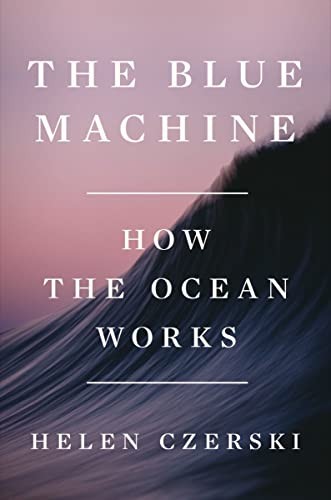Soh Kam Yung reviewed Blue Machine by Helen Czerski
A wonderful book about the machine the is the world's oceans.
5 stars
An excellent book about a global machine that people don't often think about: the global ocean. A machine takes in energy and does work, and the author shows how the ocean does that. The ocean takes in the energy of the sun, stores it mainly as heat, and uses it to move water in great currents all over the world. This affects how organisms live, for those at the surface to those living in the depths.
The book starts with showing how the machine works physically. Light from the sun heats the surface, causing evaporation and currents to form as cold water moves in to replace the lost water. The earth's rotation swirls the currents as they move north or south, which are further affected by land masses in their path. The author goes from the equator to the poles, showing how the workings of the machine affect the …
An excellent book about a global machine that people don't often think about: the global ocean. A machine takes in energy and does work, and the author shows how the ocean does that. The ocean takes in the energy of the sun, stores it mainly as heat, and uses it to move water in great currents all over the world. This affects how organisms live, for those at the surface to those living in the depths.
The book starts with showing how the machine works physically. Light from the sun heats the surface, causing evaporation and currents to form as cold water moves in to replace the lost water. The earth's rotation swirls the currents as they move north or south, which are further affected by land masses in their path. The author goes from the equator to the poles, showing how the workings of the machine affect the local conditions in areas.
All of this, of course, affects how organisms will live, by taking advantage of the conditions caused by the machine, whether to move about, eat or to breed. Humans are not exempted, as sailing ships and other early vessels also took advantage of the currents. Reading the currents also allows humans to predict where good fishing ground might be located.
All this human activity has lead to disruptions in the global ecosystem, for marine organisms depend on a predictable machine in order to survive. As an example, whaling lead to a collapse in marine microorganisms because the microorganisms depend on iron to grow, and a major source of iron was whale poop, which is now in short supply. The changing climate has also led to warmer water temperatures and changing currents, which are disrupting the lives of organisms.
In closing, the author offers some thoughts on how to reduce such disruptions. But the major point of the book is to make people more aware of the ocean and the machine that is running in it, and not to treat the oceans as a 'blank spot' that we can all throw our troubles (and refuse) into and not consider the consequences.

